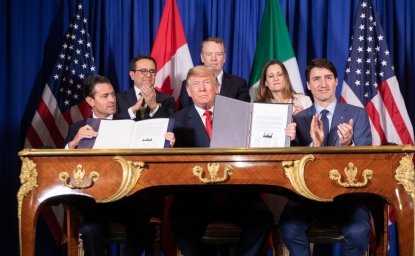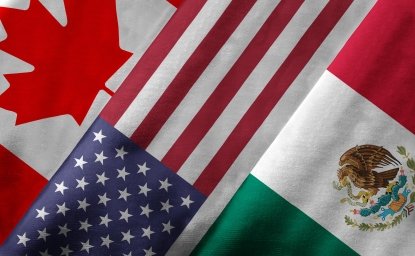I. Context
Over the last two years, there has been a great deal of criticism in U.S. domestic political discourse about trade agreements and about trade in North America. Trade has caused jobs to move between countries, as well as within the United States, but serious studies point to new technology and automation, as well as competition with China, as the major drivers of U.S. manufacturing jobs losses in this century. Other advanced economies experienced similar declines of manufacturing jobs also driven powerfully by technology. Whatever the cause of the job losses or gains, too many Americans have been left behind by changes in the market place in recent years.
Trade agreements can clearly be improved, but the U.S. should also be investing more and more smartly in the development of its current and future workers. The U.S. additionally needs to take a variety of steps in other areas to improve its ability to compete successfully with other global production centers. Importantly, as new technologies are deployed and as we move into the so-called “Fourth Industrial Revolution,” the need for better workforce development programs will only increase.
The re-negotiation of NAFTA will touch some aspects of North America’s workforce challenges. However, most of the relevant issues for workforce development across continent’s production chains will not be addressed in the negotiations. Thus, North America can benefit greatly from a separate public-private process where governments, the private sector, unions and others can explore best practices in workforce development.
II. Mission & Vision
The North American Workforce Development Initiative seeks to establish a forward-looking dialogue among the three North American countries on the issue of workforce development. Through this initiative, the Mexico Institute will build a dialogue on workforce development policy, including (but not limited to) the following priority issue areas: apprenticeships and other types of work-based learning and technical education, certifications, data collection and sharing, and best practices in approaching the Fourth Industrial Revolution.
The North American Workforce Development Initiative’s vision is to forge agreement on ways to better support the preservation and creation of jobs during the technological changes and global competition ahead.
III. What Does the North American Workforce Development Initiative Do?
Through the North American Workforce Development Initiative, the Mexico Institute will organize events, publications, and conversations on a range of issues concerning workforce development. In 2017, the initiative hosted two significant events in Washington D.C. that brought together experts from federal, state and local governments, manufacturers, unions, chambers of commerce and academic institutions from across the region. These events, publications, and conversations will share, discuss and explore ways to implement best practices across North America.

Mexico Institute
The Mexico Institute seeks to improve understanding, communication, and cooperation between Mexico and the United States by promoting original research, encouraging public discussion, and proposing policy options for enhancing the bilateral relationship. A binational Advisory Board, chaired by Luis Téllez and Earl Anthony Wayne, oversees the work of the Mexico Institute. Read more





